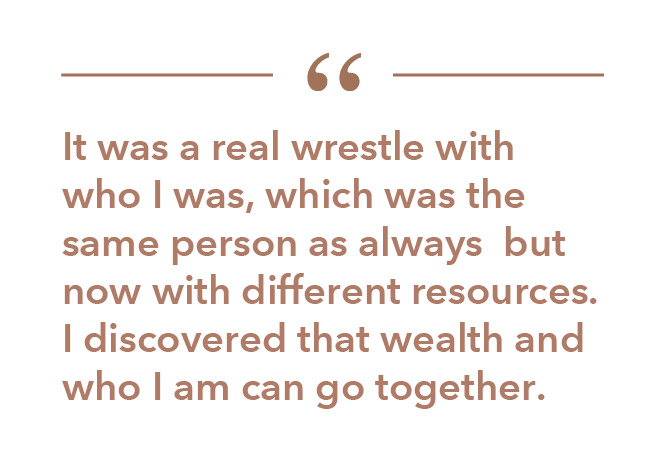Books
In the 1990s, Microsoft famously created scores of millionaires throughout its ranks by virtue of its employee stock option program. Jennifer Risher was one of them.
Risher went from middle class to multimillionaire by her early 30s, thanks to the combination of the options she and her husband had both earned at Microsoft and equity compensation he later received as an executive at Amazon.
In We Need to Talk: A Memoir About Wealth, Risher takes a look at her life, focusing on the financial issues faced at each step. Having money challenged Risher’s preconceived notions of how wealthy people behave — and her image of herself. But she found that having open conversations about the taboo topic demystifies wealth, breaks down barriers and avoids misunderstandings.
What was most surprising about having wealth?
I was still myself. Even though I told myself, “Money’s not going to buy me happiness,” some secret part of me thought it just might. I think we believe that money is going to make life perfect, and yet there I was, still someone who made mistakes and had insecurities. Another piece was the impact it had on my identity, on the way people looked at me, on relationships. It can create a distance. Yet another piece was how no one talks about it. Eight of 10 people with wealth grew up middle class or poor, yet we’re not talking about the impact it has on us.
Is it sometimes a bad idea to talk about wealth?
It’s awkward to talk about money. I’m on a mission to help us move money out of that taboo category and have conversations, because that’s how we connect to one another. That’s how we learn from one another. Not having that conversation keeps a distance between us. At a bigger level, our silence around money keeps the status quo in place. Our silence has a lot of power. I think that hurts us as a society.
For women or other people who are discriminated against — when you think about talking about money in the workforce or how much you charge per hour, how much rent you are paying — these are pieces of information that we should all share and be using to gain equality. Money is very emotional, and we have fear around talking about it. But I think often when we do talk, we find out that we’re a lot more similar than different and that our fears are shared.
Your book is a sort of journey of self-discovery through your endeavor to “do rich right.” What did you learn about yourself?
I learned that I wasn’t going to become this image that we all have of the wealthy. We see all these images of what wealthy people are and how they act, and we buy into that stereotype. I had bought into it. People are so much more diverse and so much more ordinary and so much nicer than what we see in the news and media.

I didn’t want to become a rich person. It was a real wrestle with who I was, which was the same person as always but now with different resources. I discovered that wealth and who I am can go together. I can still be true to myself and feel like I’ve become even more of who I’ve always been in that journey, just recognizing all of me and realizing that money wasn’t going to change me. It’s helped me see very positive parts of who I am: my sense of gratitude and generosity, and feeling very fortunate at being able to help other people, to have the resources to do that.
At the beginning, though, having wealth really challenged your sense of identity.
Yes, because I so identified with being responsible with my money, being frugal. It’s how I grew up. That was so much a part of my sense of self-worth and value. And it’s still important. It served me well and continues to serve me well. But when it goes against the reality of my life, there’s sort of this existential angst of feeling “What am I doing? I’m late for this meeting, and I’m driving around to save $5, and it’s causing me a lot of stress.” That took some time. I had also grown up wary of the rich, and suddenly I had become one of them. That was also something to grapple with.
You were brought up equating frugality with being responsible and were anxious that your wealth might create a distance between you and your parents. But when you finally discussed it with them, it didn’t have the impact you feared.
Yes. I avoided it. It was painful and a source of distance for me for a long time. Once I was able to connect with my parents and talk to them about it, then it did just become this thing, and it wasn’t between us the way it had been in my mind. That’s why I think talking is so important. Often when you don’t talk about something, it looms large and takes on this life of its own. Once you can talk about it and connect as people, you can put money in its place as a tool. It’s just a tool.
Do you feel like you were at a disadvantage suddenly coming into money as far as teaching your children about managing money?
We all have to teach our children well. That means financial literacy, but also passing on our values. That means living our values and walking through the world the way we want our children to walk through the world. They learn by watching us. People who are new to wealth have to deal with identity change, the way it affects relationships, their sense of place in the world. When money is new to you, you have to work on that before you can help your kids.
